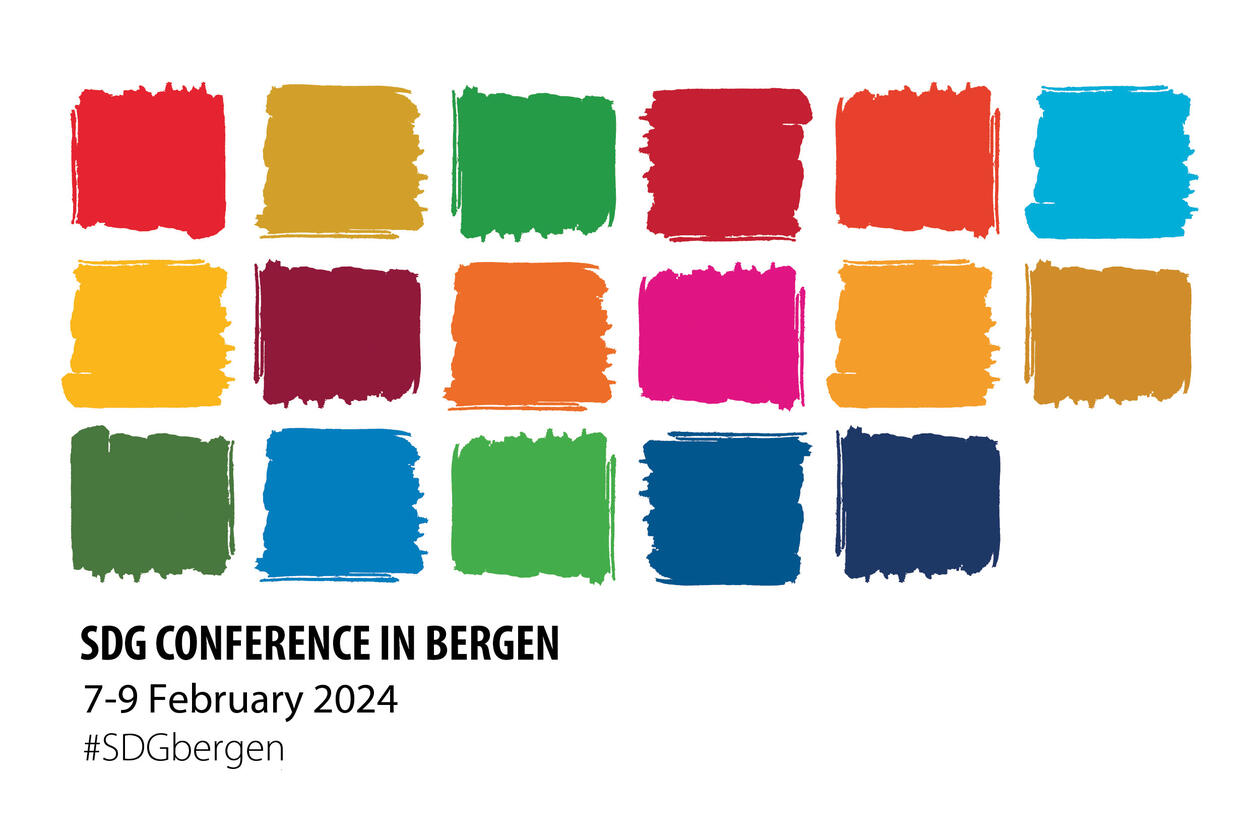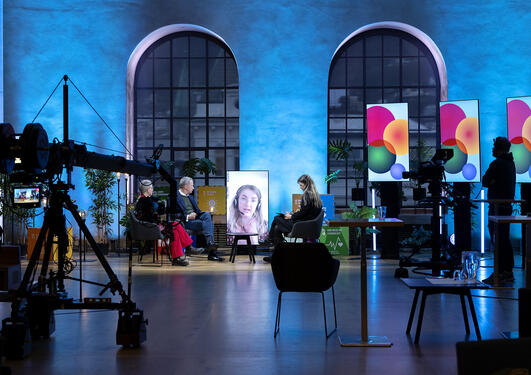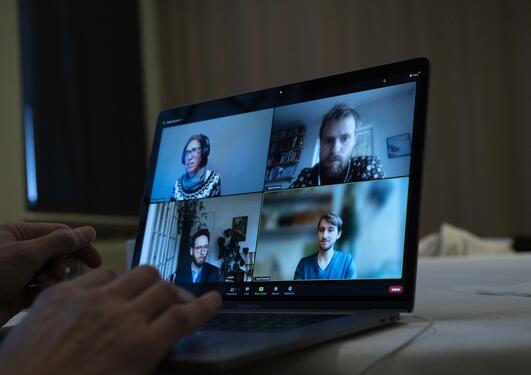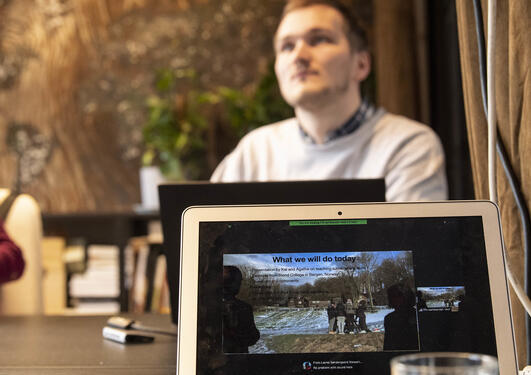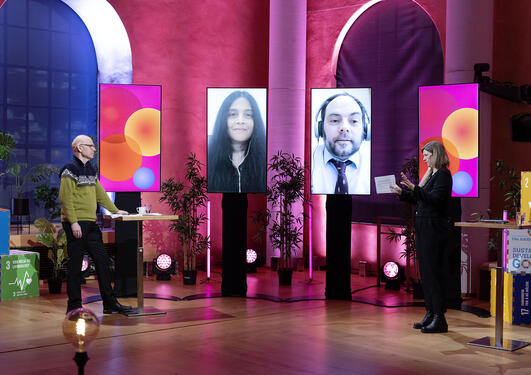SDG Conference in Bergen 2024
Welcome to the digital SDG Conference in Bergen 2024! The theme this year is 'The role of universities in transformative change'.

Main content
Unless we act now, the 2030 Agenda will become an epitaph for a world that might have been.
|
THE ROLE OF UNIVERSITIES IN TRANSFORMATIVE CHANGE
Most of the Sustainable Development Goals from Agenda 2023 will not be implemented globally. The climate and nature crises indicate a code red for humanity. Wars and rising geopolitical tension create new setbacks. There is a huge gap between needed action and the current mobilisation of political leadership, knowledge, resources and technology. How can universities and the academic profession engage in new and more radical ways?
THE PROGRAMME
See the programme below.
Day Zero: Wednesday 7 February
- Full programme for Day Zero (recording of some sessions)
Day One: Thursday 8 February
| WELCOME AND FORMAL OPENING (09:00-09:15 CET) |
- Margareth Hagen, Rector, University of Bergen
- Oline Sæther, President, National Union of Students in Norway
| KEYNOTES (09:15-10:00) |
Keynotes: setting the scene
- Farhana Sultana, Professor of Geography and the Environment, Syracuse University: Decolonizing climate governance
- Arjen Wals, Professor, Wageningen University: “A Whole University Approach to Co-creating a More Equitable, Inclusive and Ecologically Sensitive Society”
| SESSION 1 (10:00-11:30 CET) |
Transformative change for a post-SDG era
Transformative change requires fundamental shifts in how we live, work, think and play on our planet. Such paradigmatic change can appear hard to envision, posing a challenge to our imagination and speculative capacities.
Looking past 2030 and the SDGs, experts in indigenous cultures, futurisms, and transformative methods will explore the broad field between the partly unknowable future, the long-known change we need to see, and the speculative and concrete means to get us there.
- Arturo Escobar, Professor of Anthropology Emeritus, UNC, Chapel Hill
- Bodhisattva Chattopadhyay, Associate Professor Global Culture Studies, University of Oslo
- Ioan Fazey, Professor of Social Dimensions of Environment and Change, University of York
| BREAK (11:30-11:45 CET) |
An opportunity to catch up with other conference participants or to visit the special SDG poster session.
| SESSION 2 (11:45-13:15 CET) |
Empowering Change: The Role of Universities in innovation for sustainability
This session specifically focuses on the "third mission" of universities in transformative change:our responsibility and capacity to engage with society through innovation and entrepreneurship, in the business sector, and communities beyond our traditional roles of teaching and research.
In this session we invite experts, researchers, academic entrepreneurs and student entrepreneurs to offer their perspectives and accomplishments at the intersection of innovation, business and academic research.
Keynote:
Florian Lüdeke-Freund, Professor for Corporate Sustainability, ESCP Business School, Berlin: Institutional Innovation for the 'Third Mission' - Examples from ESCP Business School
Speakers:
- Ulrikke Lien, CEO, Sensorita
- Tale Skage Torjussen, Center for Innovation and Learning (SEIL), Asker Municipality
- Erik Dyrkoren, Zeabuz
| VIDEO POSTERS AND LUNCH BREAK (13:15-13:45 CET) |
An opportunity to view the special PhD/Postdoc posters while you enjoy your lunch.
| SESSION 3 (13:45-15:15 CET) |
Actionable knowledge and knowledge in action
Universities are increasingly expected to contribute to sustainability transformations through actively engaging in collaborations with businesses, policy partners, and civil society organizations.
In this session, speakers will explore questions such as: What is required for effective collaborations and knowledge suitable for social action? What are the challenges of scientists taking on more active roles in society? What are the dangers of scientists not taking on more active roles in society?
- Erlend A. T. Hermansen, Senior Researcher, CICERO Center for International Climate Research: “Knowledge for action: What, who, how?”
- Guido Caniglia, Scientific Director KLI Klosterneuburg: “Practical wisdom as a capacity for knowledge pluralism in transdisciplinary sustainability science”
- Rebecca Freeth, senior consultant at Reos Partners Africa: “Radical climate collaboration”
- Linda Sygna, Co-founder and CEO, of cCHANGE: "Transformative journeys: Integrating knowledge and action for impact"
- Marian Gazdik, Founding partner of G-Force: "How to select technologies with the potential to reduce global greenhouse gas emissions"
| BREAK (15:15-15:30 CET) |
An opportunity to catch up with other conference participants or to visit the special SDG poster session.
| SESSION 4 (15:30-16:00 CET) |
New directions and approaches
Where do the discussions of the day suggest we go from here? A visual presentation of the day by Faheemah from Bergenburg and conversation with Vice-Rector Mette Halskov Hansen, University of Oslo, and moderator.
| RECEPTION (18:00-19:00 CET) |
Nygårdsgaten 5, University of Bergen
By invitation only
Day Two: Friday 9 February (In Norwegian)
Utdanning i en verden i endring
Den siste statusrapporten for FNs bærekraftmål slår fast at verden fortsatt er på vei mot en framtid preget av dyptgripende og varige konsekvenser fra klimaendringer og naturødeleggelser i form av forringet eller ødelagte livsvilkår og økosystemer. Utsiktene til at Norge innfrir sine mål om reduserte klimautslipp og mindre naturødeleggelse innen 2030 er små.
Universiteter spiller en viktig rolle i å forme samfunnet gjennom disiplinutdanning og utdanning av ulike profesjoner. Denne samfunnsrollen har gjort universitetene og høyere utdanning til en del av krisen, men også til nøkkelaktører i arbeidet med å komme ut av den. Norske høyere utdanningsinstitusjoner har fått et politisk oppdrag om å bidra til miljømessig, sosialt og økonomisk bærekraftig utvikling. Må vi tenke radikalt annerledes om hvordan vi utdanner?
Sted: Fysisk deltakelse kun ved personlig invitasjon — Universitetsaulaen i Bergen.
Moderator: Ruth Astrid Sæter
Konferansen strømmes.
| 08:30-09:00 REGISTRERING |
Kaffe og te, Universitetsaulaen i Bergen
| 09:00-09:15 VELKOMMEN |
- Rektor Margareth Hagen, Universitetet i Bergen
- Mette Halskov Hansen, UiO, Leder Nasjonal Komite for 2030 Agenda
- Kaja Ingdal Hovdenak, Leder, Studentparlamentet, UiB
| 09:15-10:45 SESJON 5 |
Utdanning i en krisetid: De gode eksemplene på veier videre
Klarer universitetene å møte utfordringene i form av kryssende forventninger og utdanninger for et samfunn i krise og rask omstilling? Det foreligger en rekke rammeverk innen bærekraftfeltet som beskriver både hva som er viktig innhold og utkomme fra høyere utdanning i form av kompetanse og andre samfunnsbidrag.
Universiteter har også sterke og mangfoldige bånd til skolen, som har en avgjørende betydning for å realisere en bærekraftig framtid. I sesjonen løfter vi fram lovende eksempler og gode resultater fra høyere utdanning og samspill mellom universitet, skole og andre aktører i utdanning.
Innlegg:
- Videopresentasjon av prosjektene BIOART og INCLUDE
- Alfredo Jornet Gil, Universitetet i Girona, Spania
- Kjetil Rommetveit og Ingvild Thorsen, Bærekraftmasteren ved UiB
- Fern Wickson, UiT, Ocean leadership master
- Karina Mathisen, Dekan for utdanning, NTNU
Paneldiskusjon:
- Alfredo Jornet Gil, Universitetet i Girona, Spania
- Karina Mathisen, Dekan for utdanning, NTNU
- Rektor Siri Fjellheim, NMBU
- Catharina Bu, Generalsekretær, FN-Sambandet
- Kaja Ingdal Hovdenak, Leder, Studentparlamentet, UiB
| 10:45-11:00 PAUSE |
___
| 11:00-11:45 SESJON 6 |
Hvordan kan UHRs strategiske enheter bidra til etikk og bærekraft i utdanningen?
Hva kan vi få til i dagens høyere utdanning? Hva er utfordringene? Hva skal til for at UH-sektoren kan bli en transformerende kraft der vi gjennom utdanning bidrar til å nå Norges klimamål og mål fra Montrealavtalen om mindre naturødeleggelse?
Vi utfordrer fire store utdanningsområder: UHR- Lærerutdanning, UHR-humaniora, UHR- Matematikk, naturvitenskap og teknologi, UHR-økonomi og administrasjon.
Hvordan bidrar UHR sine strategiske enheter til å følge opp til å nå formålet for UH-institusjonene jf. Formålsparagrafen i UH-loven: «d. bidra til en miljømessig, sosialt og økonomisk bærekraftig utvikling.»
Paneldiskusjon:
- UHR-Økonomi og administrasjon, Gry Alsos
- UHR-Matematikk, naturvitenskap og teknologi, Arne O. Smalås
- UHR-Lærerutdannings leder Asle Holthe
- Rektor Dag Rune Olsen, UiT Norges arktiske universitet
| 11:45-12:15 RUNDEBORD |
Hvilke utfordringer må løses?
Innspill vil løftes inn i diskusjon etter lunsj.
| 12:15-13:00 LUNSJ |
Universitetsaulaen i Bergen.
| 13:00-14:00 SESJON 7 |
Høyere utdanning i møte med klima- og miljøkrisene – hva kreves av politikerne og hva kreves av akademia?
Bærekraftsomstillingen stiller store krav til kompetanse, kunnskap og innovasjon. Hva kreves av politikere og hva kreves av akademia for at samfunnet skal møte disse kravene? I dette panelet følger vi opp utfordringene fra salen, og diskuterer konkret som trengs for at høyere utdanning skal møte klima- og miljøkrisene.
Paneldiskusjon:
- Lars Haltbrekken, SV, Medlem av Stortingets Energi- og miljøkomite
- Linda Monsen Merkesdal, AP, Medlem av Stortingets Energi- og miljøkomite
- Rektor Margareth Hagen, Universitetet i Bergen
- Oline Sæther, leder, Norsk studentorganisasjon
- Idar Kreutzer, Områdedirektør, NHO
- Vigdis Vanvik, professor, CeSAM senter for bærekraftig arealbruk, UiB
| 14:00-14:30 SESJON 8 |
Hva må universitetene gjøre for å møte utfordringene?
UH-loven forplikter våre utdanningsinstitusjoner til å bidra til omstilling for å møte klima- og miljøkrisene. Hvordan kan universitetene bidra konkret til å løse krisene? Må universitetene også endre seg?
Paneldiskusjon:
- Jakob Grandin, Seniorrådgiver, Klimaetaten, Bergen kommune, og Førsteamanuensis II, Senter for klima- og energiomstilling, Universitetet i Bergen
Åse Gornitzka, prorektor for forskning og internasjonalisering, UiO
Marit Reitan, prorektor for utdanning ved Norges teknisk-naturvitenskapelige universitet (NTNU)
| 14:30-14:40 AVSLUTNING |
Erik Knain, leder for programkomiteen for SDG Conference 2024
